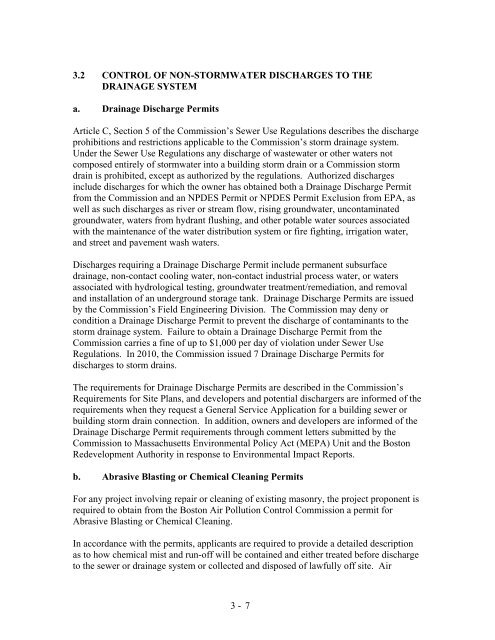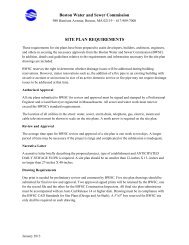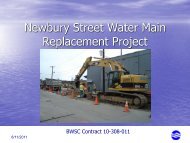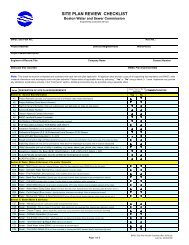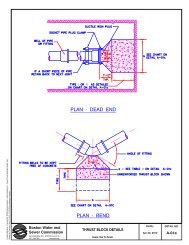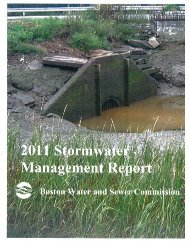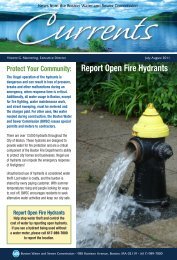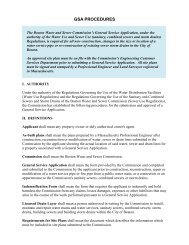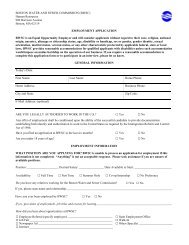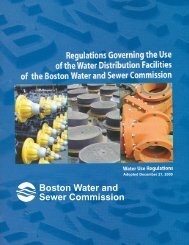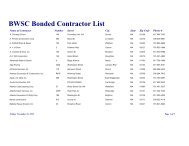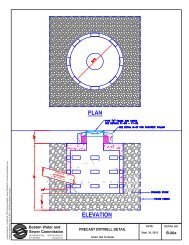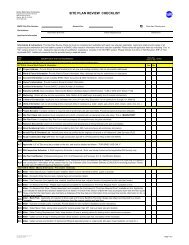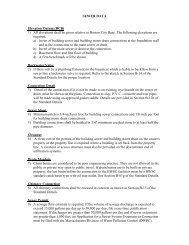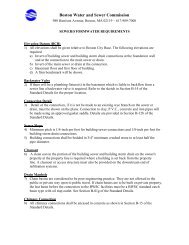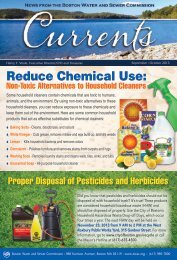2010 Stormwater Management Report (PDF) - US Environmental ...
2010 Stormwater Management Report (PDF) - US Environmental ...
2010 Stormwater Management Report (PDF) - US Environmental ...
Create successful ePaper yourself
Turn your PDF publications into a flip-book with our unique Google optimized e-Paper software.
3.2 CONTROL OF NON-STORMWATER DISCHARGES TO THE<br />
DRAINAGE SYSTEM<br />
a. Drainage Discharge Permits<br />
Article C, Section 5 of the Commission’s Sewer Use Regulations describes the discharge<br />
prohibitions and restrictions applicable to the Commission’s storm drainage system.<br />
Under the Sewer Use Regulations any discharge of wastewater or other waters not<br />
composed entirely of stormwater into a building storm drain or a Commission storm<br />
drain is prohibited, except as authorized by the regulations. Authorized discharges<br />
include discharges for which the owner has obtained both a Drainage Discharge Permit<br />
from the Commission and an NPDES Permit or NPDES Permit Exclusion from EPA, as<br />
well as such discharges as river or stream flow, rising groundwater, uncontaminated<br />
groundwater, waters from hydrant flushing, and other potable water sources associated<br />
with the maintenance of the water distribution system or fire fighting, irrigation water,<br />
and street and pavement wash waters.<br />
Discharges requiring a Drainage Discharge Permit include permanent subsurface<br />
drainage, non-contact cooling water, non-contact industrial process water, or waters<br />
associated with hydrological testing, groundwater treatment/remediation, and removal<br />
and installation of an underground storage tank. Drainage Discharge Permits are issued<br />
by the Commission’s Field Engineering Division. The Commission may deny or<br />
condition a Drainage Discharge Permit to prevent the discharge of contaminants to the<br />
storm drainage system. Failure to obtain a Drainage Discharge Permit from the<br />
Commission carries a fine of up to $1,000 per day of violation under Sewer Use<br />
Regulations. In <strong>2010</strong>, the Commission issued 7 Drainage Discharge Permits for<br />
discharges to storm drains.<br />
The requirements for Drainage Discharge Permits are described in the Commission’s<br />
Requirements for Site Plans, and developers and potential dischargers are informed of the<br />
requirements when they request a General Service Application for a building sewer or<br />
building storm drain connection. In addition, owners and developers are informed of the<br />
Drainage Discharge Permit requirements through comment letters submitted by the<br />
Commission to Massachusetts <strong>Environmental</strong> Policy Act (MEPA) Unit and the Boston<br />
Redevelopment Authority in response to <strong>Environmental</strong> Impact <strong>Report</strong>s.<br />
b. Abrasive Blasting or Chemical Cleaning Permits<br />
For any project involving repair or cleaning of existing masonry, the project proponent is<br />
required to obtain from the Boston Air Pollution Control Commission a permit for<br />
Abrasive Blasting or Chemical Cleaning.<br />
In accordance with the permits, applicants are required to provide a detailed description<br />
as to how chemical mist and run-off will be contained and either treated before discharge<br />
to the sewer or drainage system or collected and disposed of lawfully off site. Air<br />
3 - 7


